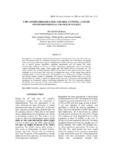| dc.description.abstract | Bangladesh is a developing country having diversified environmental issues especially in the city
area. The present study was conducted in Sylhet City Corporation; one of the rapidly developing
urban areas in the north-eastern region of Bangladesh to identify the main environmental problems
due to rapidly increase population, unplanned urbanization and hill cutting. The major
environmental problems in the city are traffic obstruction, inappropriate solid waste disposal
system, inadequate water supply, water logging state, hill cutting, chance of seismicity, etc. The
nature and life style of Sylhet intimately related with the hills are thus under the threat of a drastic
imbalance in its ecosystem. This study also investigates the causes of hill cutting along with its
probable impact on environment such as deforestation, loss of biodiversity, ecological imbalance
and climatic change, chances of earthquake will increase, destroying natural beauty, soil erosion
and landslide, etc. Sylhet is located in highly seismic risk zone 3 but most of the buildings and
apartments are constructed without considering earthquake risk. The City Corporation authority
should take a new approach to tackle urban problems by investing new ways to solve them, taking
advantages of unused resources and opportunities. | en_US |

